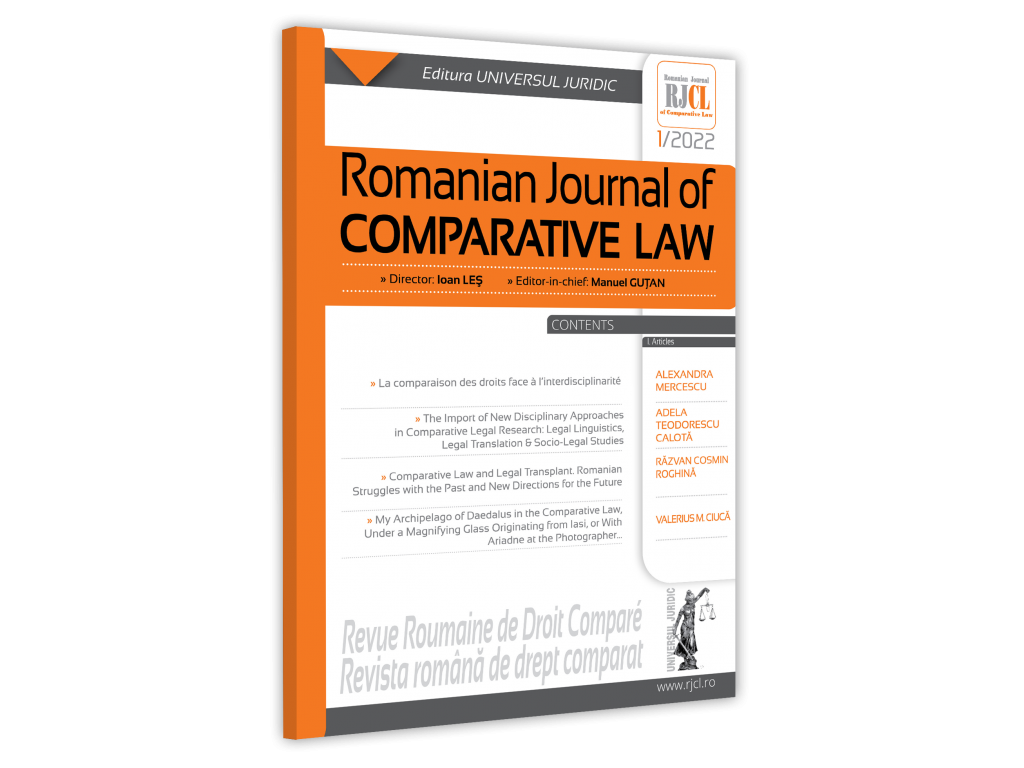Comparative Law and Legal Transplant. Romanian Struggles with the Past and New Directions for the Future
Comparative Law and Legal Transplant. Romanian Struggles with the Past and New Directions for the Future
Author(s): Răzvan Cosmin RoghinăSubject(s): Law, Constitution, Jurisprudence, History of Law, Civil Law, Comparative Law
Published by: Universul Juridic
Keywords: comparative law; comparative perspectives; legal transplant; comparatist; Romanian comparative law; comparative legal knowledge;
Summary/Abstract: Comparatists began to convey more and more attention to the relationship between law and culture, law and language, and law explored through contextualized social mirrors. Not only because it is a false impression that one may correctly depict and understand legal messages without placing context and using the appropriate language, but also because the evolution of a society is not mathematically synchronized with legal institutions, rules and concepts, especially when they are not domestically produced. These observations are due to the experience gained by the science of comparative law – a large library of law in the making and transformation, intended to explain, educate and, where appropriate, revise law creation and migration. However, the experience we are referring to is a general one in time and space. It is the experience deposited in the world's library of comparative law. Once lowered to the level of national shelves, the horizon of knowledge is reconfigured through specific epistemological approaches. The present article aims to explore the meaning of comparative law related to the phenomenology of legal transplant, in order to then seek a reflection on past and current Romanian experiences – shortcomings, struggles, pride, new directions – considering the fact that law and legal language are linked as a result of experience and contact with certain information (which may be translated by limited choices due to self-sufficiency) and transformative or conservative historical knowledge. In order to challenge the Romanian doctrine of comparative law, it is necessary, first of all, to determine the landscape of the challenge. We will proceed in this direction in the first part of the paper. In the second part, we will shake hands with the Romanian doctrine of comparative law, with references to the issue of legal transplant understood through the evolutionary analytical filters of comparative law. The content of the critical pendulum is determined by the following model of thinking "discover the choices and omissions of a doctrine and the level of knowledge determined by the scientific pattern/volume will be revealed". The general purpose of the paper is to show that the surface of written law is finite, but its content may be infinite due to the intimate connections with the layers of society. For this, legal knowledge must have not only research benchmarks but also brakes of scientific awareness and of one's own real epistemological possibilities, because depending on the assumptions one makes and what one knows, the outcome may change. The same truth applies in the case of legal transplant, which is not always scientifically rigorous but rather based on speculation of social and legal ideas gathered in law. One thing is clear: law is created to give meaning to the world around us and, consequently, legal rules and principles does not exist or function outside of us. We don't simply discover law. However, a given law may not be properly understood. If we don't understand (our) law, we don't understand the world around us? Or is it just that a particular law may not be part of our (national) world because it is not our own product and, thus, cannot be organically mastered? Comparative law explores such issues, e.g., within the challenge of understanding law as culture, and can provide answers, but the latter ultimately depend on the volume and quality of the legal knowledge of the comparatist.
Journal: Revista Română de Drept Comparat
- Issue Year: 2022
- Issue No: 01
- Page Range: 55-105
- Page Count: 51
- Language: English
- Content File-PDF

